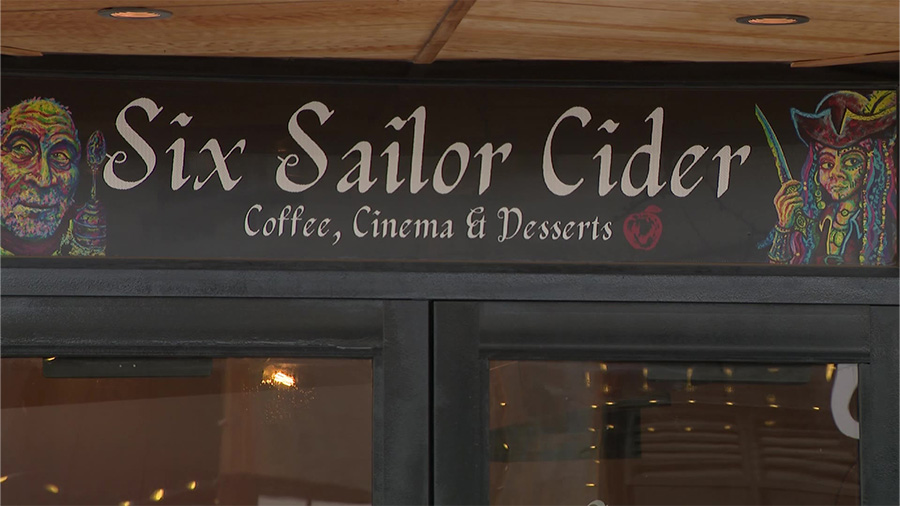((JEWISH REVIEW)) – Utah officials are investigating after a cidery and bar in Salt Lake City announced “No Zionists Allowed.”
Michael Valentine, owner of Six Sailor Cider and Weathered Waves Bar, also targeted a local Chabad-Lubavitch rabbi and kosher food truck operator who publicly criticized the business owner’s stance.
“As many are, we are horrified by the ongoing genocide in Gaza and are even more horrified to see so many Americans ignore and rationalize ethnic cleansing,” the businesses announced in an Instagram post Monday headlined “No Zionists Allowed.” “That is why we are pleased to announce we are banning all zionists forever from our establishments.”
In a statement, a spokesperson for the Utah Department of Alcoholic Beverage Services told (JEWISH REVIEW) that it has contacted the Utah Attorney General’s office “so they may conduct an investigation on whether the business is violating discrimination laws.”
The department also said it was reviewing its own options “for responding to discrimination” at its licensed establishments. It is unclear if Zionists would be considered a protected class under discrimination law. The bar claimed it was not banning Jews, a distinction many Jewish groups brush aside, positing that bigots have long used “Zionist” as a stand-in for “Jewish” and pointing to surveys showing that a majority of American Jews express an affinity for Israel.
The dispute in Utah comes as the local City Council passed new restrictions on public comment, shortening the time allotted to it, largely in response to anti-Israel activism that took center stage during a recent council deliberation about a ceasefire resolution. Progressive spaces and activists across North America have targeted Jewish- or Israeli-owned businesses and establishments in protest of the war in Gaza.
In its Instagram post, Six Sailor Cider writes that “Zionism is hate speech. It is white supremacy and has nothing to do with the beautiful Jewish faith. we forever stand firmly with the people of Gaza and humanity.” The post ended, “We dream of a free and prosperous Palestine. Ceasefire Now.”
According to the Salt Lake Tribune, the businesses had just been awarded a liquor license last week. Valentine, a former independent mayoral candidate, told the paper he wrote the post and that he did not believe it was antisemitic. He did not respond to a (JEWISH REVIEW) request for comment Wednesday.
Rabbi Avremi Zippel, whose Yalla Kosher food truck operates about a 15-minute drive from the bar, was not named in the initial post. But he said Jews and supporters throughout the community pressured him to make a statement about it, so he fired off a response on the Yalla Kosher Instagram account.
“It’s been brought to our attention that a local business has shown boundless bravery and formally taken a position that they won’t be serving folks with a certain belief system,” Yalla’s post reads. “Their call. (Probably illegal, but not our problem.)”
The post later continued, “Values aside, we think you’d prefer our shawarma over some cider that sympathizes with sexual violence” — a reference to reports that Hamas terrorists raped and sexually assaulted women during the Oct. 7 attacks in Israel.
On his own account, Valentine named Zippel specifically, challenging him, “If your business is for everyone, is it also for Palestinians? Do you condemn the genocide in Gaza?” He added that his business was still open to “anti-Zionist Jews” and told the rabbi, “You have no moral ground to stand on spreading hate speech in city council meetings.”
“This was something which definitely had a very pointed and direct angle to it from the very beginning,” Zippel, a rabbi at Chabad of Utah, told the Jewish Telegraphic Agency.
It wasn’t Zippel’s first time as a local advocate. He recently spoke during public comment at the City Council meeting opposing a ceasefire resolution backed by pro-Palestinian supporters; the measure wound up failing, with the council instead backing a broader “pro-peace” resolution.
At that meeting, Zippel said he had also attracted the ire of Valentine, who is also a filmmaker and a prominent local pro-Palestinian activist. After Zippel posted that he spoke “amid a sea of masks and keffiyehs and those openly calling for my annihilation,” Valentine accused him of “anti-Palestinian, anti-Arab, anti-Muslim rhetoric” and wrote, “It’s amazing a rabbi would make such open and dismissive remarks about an entire race, religion, and culture of people. It speaks volumes of the white supremacy in that room last night.”
Both men have traumatic personal histories. Zippel is a professed survivor of child sexual abuse, and has written a memoir of his experiences while fighting to prosecute his abuser in court. Valentine is a formerly homeless person, and made homelessness a centerpiece of his failed 2023 mayoral campaign; he also at one point chained himself to a local movie theater in order to protest its planned demolition.
Zippel said he doesn’t take Valentine’s attention seriously. “He is neither a well nor a serious person,” the rabbi said. “I don’t intend to go within 100 yards of the store.” He added that he has received a groundswell of support from his customers and allies since the initial post.
The Salt Lake City incident comes as other outwardly Jewish people and institutions have also been targeted by protests. Anti-Israel protesters, some Jewish, picketed a synagogue in Miami Beach last week where pro-Israel lawyer Alan Dershowitz gave a talk, and synagogues that have hosted a real-estate company advertising investments in Israel and the West Bank have been the site of sometimes violent altercations in both the U.S. and Canada in recent days.
A university student union in Vancouver came close to holding a vote to force a Hillel off campus, while the prominent Jewish reggae star Matisyahu has also been targeted by protests while on his current U.S. tour, leading to a few venue cancellations.
Zippel told (JEWISH REVIEW) that some of his supporters have filed civil-rights complaints against Valentine and his business, alleging that refusing to serve Zionists is akin to discrimination. But the rabbi himself is now done fighting the cidery’s owner.
As to why he got involved at all, Zippel replied, “I feel like it’s valuable for the residents of this city and for folks everywhere to see the stark contrast in approach and behavior between our place of business and theirs.”




